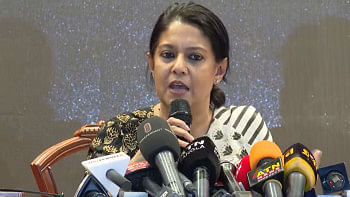Honouring Our Nation's Conscience

Thirty five years ago today, Bangladesh lost one of its vanguards of its movement for emancipation. He is Abul Mansur Ahmad, the pioneering intellectual leader whose literary works and revolutionary thoughts have laid the foundation of an independent Bangladesh.
Ahmad's uncompromising activism for democracy, ethics and transparency showed us the path to a democratic, harmonious and progressive Bangladesh. Besides his political wisdom, Ahmad was also a gifted writer. His autobiographies and satirical writings are some of the best creations in the history of Bengali literature. However, after his demise, Bangladesh started to forget the legacy of this great philosophical leader. His literary works and enlightening articles were about to be forgotten.
Just a couple of years ago, a young writer and researcher named Emran Mahfuj started to bring back the works of Abul Mansur Ahmad through his literary magazine called Kaler Dhoni. During his research, Mahfuz managed to obtain a number of valuable articles written by the leading scholars and authors on the life and works of Abul Mansur Ahmad.
With these articles, Prothoma, one of Bangladesh's leading publication houses, has published a voluminous book called “Abul Mansur Ahmad Sharakgrontho”. Edited by Emran Mahfuj and a panel of expert editors such as Professor Rafiqul Islam, Syed Shamsul Haq, Professor Anisuzzaman, Shamsuzzaman Khan and Syed Abul Maksud, this impressive book of 352 pages has included a wide range of essays on different aspects of Abul Mansur Ahmad's life and works. Scholars like Professor Dr Anisuzzaman, Professor Serajul Islam Chowdhury have written on his intellectual and literary writings, the articles of pioneering journalists such as S M Ali and Muhammad Jahangir have reflected the lesser known but groundbreaking contribution of Ahmad in the field of journalism and freedom of press.
In total, this book presents thirty eight articles written by renowned scholars, authors, journalists and his fellow activists. In the contents, these thirty eight articles have been arranged under six topics such as literature, journalism, politics, intellectual practice, life and memory. Thanks to this topical arrangement, a reader can easily explore a particular part of this great life. In addition to these articles, this book has twenty two pages of rare, historic photographs capturing some of the historic moments of Ahmad's eventful life and of Bangladesh as well. In the last page of the photographs, there are two scanned copies of the newspapers named The Nabajug and The Ittehad. By working as the editors of these two pioneering newspapers, Ahmad established the milestone of journalism without fear and favour in Bangladesh.

Following these photographs, in the three addendum of the book, more valuable, enticing resources are waiting for the readers. In the first addendum, Ahmad's historic speech in Pakistan's National Assembly in 1956 has been documented in his own words. By studying this speech a reader can explore the historic facts how the West Pakistani rulers were depriving Bangladeshis from their rights from the very beginning and how leaders like Ahmad had to struggle for the rights of our countrymen, the struggle which ultimately led to the liberation war of Bangladesh.
A sample of Ahmad's own hand writing and his family tree has been given in the second and third addendum. A list of commentaries of noted personalities on Ahmad's contribution, a list of all of his publications and a detailed biographical timeline have also been added in the concluding pages of this epic, voluminous book.
In this tumultuous time, when the whole nation is divided; when corruption and mismanagement have polluted every layer of governance, this book can be an enlightening guideline for the young generation. This book enables the readers of this generation to delve into the history of our nation through the life of one of this nation's architect. This must-read book is available in all the outlets of Prothoma and in every prominent book stores. It can be obtained at only 550 Tk.


 For all latest news, follow The Daily Star's Google News channel.
For all latest news, follow The Daily Star's Google News channel. 



Comments